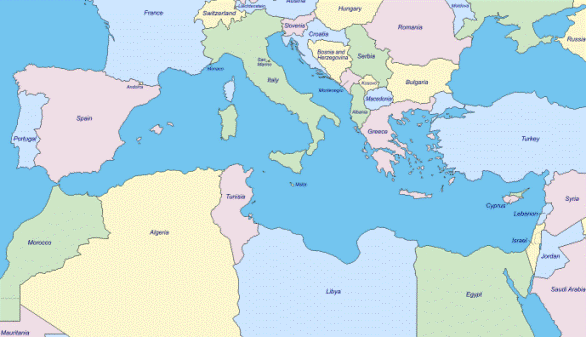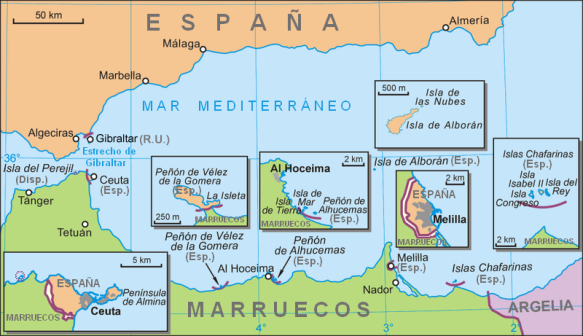 What would European governments do if in a single day 20,000 or 30,000 migrants cross the Mediterranean Sea and reach European shores? As things stand, this is likely to happen sooner than later and European governments will be able to do little about it.
What would European governments do if in a single day 20,000 or 30,000 migrants cross the Mediterranean Sea and reach European shores? As things stand, this is likely to happen sooner than later and European governments will be able to do little about it.

The following day, there will be emergency meetings everywhere. Navies and coastguards will start taking a more active role tackling the seemingly unexpected development. Yet, soon they will realise that due to budget cuts there are not enough vessels and seamen to patrol the Mediterranean Sea. And if a Navy vessel reaches any of the dinghies or ‘fishing’ boats peppering the Mediterranean Sea, what can be done about it? Repatriate the migrants? But to which country, as the people crowding the boats come from a multitude of nationalities and most likely they disposed of their identity documents upon jumping on-board. There is also the issue that EU countries are signatories of the UN refugee conventions and protocols and UNHCR data shows that over 80% of the people attempting to reach Europe ‘are fleeing violence or persecution in their homelands.’
An emergency EU committee will be established -- its recommendations to follow a few months later. The recommendations will be heavily debated and an agreement on an action plan will not be immediately forthcoming. The debate could also degenerate into a far-right versus far-left circus igniting passions, but little else. Meanwhile, the multi-million business of the illegal transport of migrants to Europe will continue flourishing. Inevitably, some fundamentalist terrorists will take advantage of the trend and perhaps indoctrinate a few people whilst waiting for processing at a refugee camp –a post on a random jihadi blog we recently examined curiously discussed a conflict between Europe and Islam at the same time as migration to Europe by boat!
Some might say that 20,000 or 30,000 migrants reaching European shores in a single day is an alarmist thought, but not really. Like flash mobs, this can be orchestrated via cellular phones and social media, particularly when there are profits to be made by any of the adverse private forces involved in human trafficking and smuggling. There is already the precedent of the over 800 migrants storming the Morocco-Spanish border back in March 2014 and attempting to climb the fence separating Africa from the Spanish enclave of Melilla (see video).

This is approximately the same number of people currently camping in Calais, France, and hoping to reach the United Kingdom one day. Indeed, once inside continental Europe the migrants arriving by boat from North Africa can easily move across the countries signatories of Schengen Agreement. The UK is not a signatory of the Agreement.
Over three years ago, we published the post ‘The fear of mass migration from Libya (and North Africa) into Europe.’ It is a this point in 2011 when we thought that this was a problem getting out of hand and something needed to be done by the EU promptly. Fast forward to 2013, during the first six months UNHCR estimated that some 8,400 migrants and asylum-seekers landed on the coasts of Italy and Malta alone; the figure is substantially higher for 2014. Accelerating the trend, the exodus of thousands of Syrians continues unabated; a refugee crisis compounded by the rise of ISIS. There is also the new wave of people escaping Ukraine and ‘democratic’ Egypt, Iraq, and Libya, and so on.
The coverage of the issue by the news media has been uneven, as stories have largely focused on the humanitarian dimension of the problem. Hundreds of people drowning yearly while attempting to reach Europe is indeed a humanitarian catastrophe. UNHCR estimated that, as of May 13, at least 170 have died in 2014. Besides the humanitarian debate, however, we need to pay greater attention to the real problem: a migration crisis that needs to be carefully managed and monitored and for which we need novel resources and solutions.
In the absence of any breakthrough since we first highlighted the problem in 2011, we adventure to propose that one solution involves the EU outsourcing the patrolling of the Mediterranean Sea in the search for migrants to the maritime security industry. We first proposed this idea in 2012, when we pondered ‘how much will change in the near future now that Syria is next on the list and Egypt’s Spring is heading to an ambiguous Autumn’ (Mass migration, the Arab Spring, and multilateral management: with or without PMCs?), Yes, the same type of private military and security personnel providing maritime security in piracy hotspots. However, an operation of this size can only be done by a consortium of Private Military and/or Security Companies and via an umbrella contract of LOGCAP’s magnitude. But then again, we need to wait for the crisis to explode on our face before we can move to brainstorm properly real-world solutions. So we will wait for the time when 30,000 or so migrants reach European shores in a single day and the death roll escalates commensurably to continue this discussion.
July 2, 2014
POSTSCRIPT:
UK to send Nato summit fences to Calais to deter illegal immigrants. As numbers have risen, clashes have erupted at detention centres, prompting the mayor of Calais to issue a direct appeal to the UK to help deal with the trouble. The Guardian, September 7, 2014: TEXT | PICTURE
British government pledges £12m to tackle 'illegal immigration' from Calais. The home secretary Theresa May and her French counterpart Bernard Cazeneuve aim to strengthen the port's security. By Nadia Khomami, The Guardian, September 20, 2014: TEXT | PICTURE
Migrants try to storm ferry after breaking into port of Calais. Hundreds of migrants are rounded up by police after they scale fences around the port of Calais, France, and try to force their way onto a P&O Ferry. By Miranda Prynne, The Telegraph, September 4, 2014: TEXT | PICTURES
...
